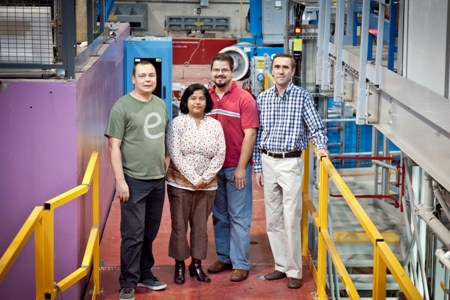Theoretically, during the doping of a chaotic magnetic insulator material with nonmagnetic material’s atoms, the magnetic interferences between the material’s magnetic ions will be lessened.
However, according to Neutron Scattering Science Division’s Matthew Stone and his partners from Stanford University, during the doping of the antiferromagnetic insulator barium manganate, where the manganese is replaced by the nonmagnetic vanadium atoms, the magnetic excitations or magnons of the barium manganate retained their energy and strength.
 CNCS and POWGEN instrument scientists. From left: Georg Ehlers, Ashfia Huq, Matt Stone, and Andrey Podlesnyak. Credit: Gen Martin
CNCS and POWGEN instrument scientists. From left: Georg Ehlers, Ashfia Huq, Matt Stone, and Andrey Podlesnyak. Credit: Gen Martin
The research findings will provide the basic knowledge of magnetic interferences in insulator materials. The findings can also be used to enhance applications of magnets in devices, said Stone.
Stone and his partners utilized Ba3Mn2O8 powder samples produced by Ian Fisher's research team at Stanford University. The researchers carried out their work at the SNS Powder Diffractometer (POWGEN) and Cold Neutron Chopper Spectrometer (CNCS). At POWGEN, they observed the crystal structure of the material and at CNCS, they observed the excitations.
Stone stated that even after the addition of 30% vanadium, the researchers were able to see the original excitations. Surprisingly, they also observed low-energy excitations in those doped materials during the neutron scattering of the nonmagnetic substituted material, he said. POWGEN allowed the researchers to see the added vanadium is reaching the right spot of the crystal and the CNCS helped them to measure the magnetic excitations in different dopings of the samples, he added.
Using neutron scattering, the CNCS measured the energy loss of the neutrons that occurred during the excitation of the spin dimers, the magnetic excitations in the non-doped compound. Stone explained that if you place these dimers in a lattice, they get excited and then transmitted via the lattice, resulting in an energy transmission called a magnon. The researchers added vanadium to break these dimers, he said.
Stone further said that every dimer in this material can spot its neighbors located at various distances, thus it can still transmit its magnetic information across the network even in the presence of broken dimers. This is the reason behind the retention of magnetic excitations, he said. The researchers’ next step is to develop a crystal and arrange a number of such crystals together to create an optimum-sized sample in the neutron beam. They will take the measurements of that sample at the CNCS or at HFIR’s Cold Triple-Axis Spectrometer (CTAX).
Stone continued that the powder measurement allowed the researchers to observe the existence of a magnon and its upper and lower energy. With a crystal, the researchers can thoroughly understand its propagation via the lattice, he added.